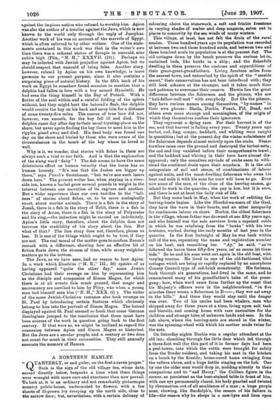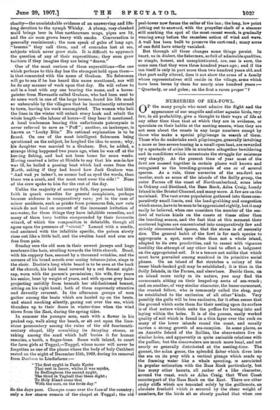A NORTHERN HAMLET.
4f ITARTERLY, or and gules; on the first a raven proper."
kee Such is the sign of the old village inn, whose date, earved directly below, bespeaks a time when these things were wrought with more care and exactness than now prevail. To look at, it is an ordinary and not remarkably picturesque country public-house, undecorated by flowers, with a few shoots of ill-grown ivy creeping up the north side, close to the narrow door; but, nevertheless, with a certain delicacy of colouring above the stenework, a soft and friable freestone in varying shades ef umber and deep magenta, eaten out in place; to concavity by the sea winds of many winters. This village, at least, has not felt the drain of the rural exodus. Three hundred years ago its population was rectorded at between two and three hundred souls, and between two and three hundred souls its population is at the present day. The old cottages down by the beach preserve the anthems let-in, curtained beds, like bunks in a ship ; and the fleherfolk dwelling in them preserve the customs and superstitions of their great-great-grandfathers. Living fourteen miles from the nearest town, and untouched by the spirit of the "seaside resort," their conservatism has not been interfered with ; they still look askance at the stranger, and it takes much time and patience to overcome their reserve. Herein lies the great difference between the fishermen and the pitmen, who are " bail-fellow-well-met " with everybody. But like the pitmeri, they have curious names among themselves, " by-names " in their owe phrase : Sheila, Pechie, Punch, DoeA, and others even more strange and meaningless, Of the origin ef which they themselves confess their ignorance.
They represent a -dying race. For their harvest is of the sea, and that harvest is failing every year. Twenty years ago turbot, cod, ling, conger, haddock, and whiting were caught in quantities; but at the present day the winter subsistence Of the fishermen depends almost entirely upon the crabs. Steam trawlers came over the ground and destroyed the turbot-nets; the cod and hug vanished before their comprelmusive trawl; and the haddock and whiting in their tinn have ahliait dis- appeal-ed; only the countless myriads of crabs BROM to with- stand the continual drain upon their numbers. It le the old antagonism of sail and steam, of combinations of labour against units, and the coast-dwelling fisherman who owns ble boat and sails it with his sons for crew will have to go. Even now some of the men, at the close of the herring season, go inland to work in the quarries; the pay is low, but it is sure, and there is not at least the daily risk of life. But they come back in May, when the work of refitting the herring-hoats begins. Like the Sliochame-mara of the Gael, they have the wave in their hearts, and an utter incapacity for coetinuous labour on shore. Emilie, the oldest fisherman in the village, whose father was drowned at sea fifty years ago, and who himself was the sole survivor from a capsized coble in which he was retul-ning from the "banks" with his two brothers, worked during the early months of last year in the quarries. In the first fortnight of May he was back within call of the sea, repainting the name and registration number on his boat, and remulking her. "Ay," he mid, " wive followed the harm these fifty-five years, an' aa canna let them bide." So he and his sons went out again in the old bout, with varying thecess. He lived in one of the old-fashioned tiled cottages which are being so rapidly replaced by an amorphous County Council type of red-brick monstrosity. His forbears, back through six generetiens, had lived in the same, and he remembered many of his grandfather's tales of the press- gang : how, when word came from further up the coast that his Majesty's officers were in the neighbourhood, "in five minutes there wesna a fisherman in B—; they wor aal away to the hills." And there they would stay until the danger was over. Two of his uncles had been whalers, men who shipped away for three years at a time, living upon salt tack and biscuits, and coming home with rare curiosities for the children and strange tales of unknown lands and seas. In the loft above, where the herring-nets are stored in the winter, WWI the spinning-wheel with which hie mother made twine for the nets.
On Saturday nights Dothie was a regular attendant at the old inn; slouching through the little door which led through a three-foot wall (for this part of it in former days bad been a peel-tower, into which the cattle were brought for safety from the Border raiders), and taking his seat in the kitchen on a bench by the fireside; home-cured hams swinging from the rafters above, and a huge kettle singing on the hob. One by one the older men would drop in, nodding silently to their companions and to "sad Harry," the Caliban figure in the corner, as persistent as the beer-stained table in front of him, with one eye permanently closed, his body gnarled and twisted by rheumatism out of all semblance of a man ; a bugs purple nose, showing, like Bardolph's, the reason of his failure in
reason why he sleeps in a cow-byre and lives upon charity—the unmistakable evidence of an unswerving and life- long devotion to the nymph Whisky. A plump, rosy-chreked maid brings beer in blue earthenware mugs, pipes are lit, and the air soon grows heavy with smoke. conversation is generally reminiscent ; the men speak of gales of long ago, "breezes" they call them, and of comrades lost at sea, subjects which never grow stale. It is difficult to approach the question of any of their superstitions; they soon grow taciturn if they imagine they are being "drawn."
One of the most curious of these superstitions—the one which perhaps to this day has the strongest hold upon them— is that connected with the name of Graham. N.? fisherman will go to sea if he has heard this name mentioned, nor will lie do any manner of work upon that day. He will refuse to sail in a boat with any one bearing the name, and a house- painter from Newcastle called Graham, who had been sent to do some work in one of the large houses, found his life made so unbearable by the villagers that he incontinently returned to town, leaving his work uncompleted. The women who bait the lines in the winter will unbait every hook and rthait the whole length--,the labour of hours—if they hear it mentioned. A local tradesman bearing this unfortunate patronymic is never referred to save as " Puff "; another, an innkeeper, is known as "Lucky Bits." No rational explanation is to be found. On one of the most intelligent fishermen being questioned on the subject, he laughed the idea to scorn; why, his daughter was married to & Graham. But, he added, a strange thing happened two years ago, when he was off at the herring fishing, and had not been home for some weeks. Having received a letter at Shields to say that his son-in-law was ill, he hailed a passing boat which had come from the North, asking if they had heard how Jack Graham was. " And wad ye beleev't, ne soonor bad aa eyed the words, than theor wee a crash, and the mast went ower the side !" None of the crew spoke to him for the rest of the day.
Unlike the majority of country folk, they possess but little faith in quack remedies for general complaints, perhaps because sickness is comparatively rare; yet in the case of minor accidents, such as pricks from poisonou.s fish, raw cuts which do not heal on account of the incessant irritation of sea-water, for these things they have infallible remedies, and many of them keep bottles compounded by their favourite wizard, of which the composition is debatable, though all agree upon the presence of "vitriol." Lanced with a needle, and anointed with the infallible specific, the poison slowly rises out like a little ball, and the swollen hand and arm are
free from pain.
Sunday sees the old men in their newest jerseys and huge isombrero-like hats, strolling towards the little church. Doad, With his coppery face, seamed by a thousand wrinkles, and the corners of his broad mouth ever oozing tobacco-juice, sings in the choir. Boobies long white beard is to be seen at the back of the church, his bald head covered by a red flannel night- cap, worn with the parson's permission; his wife, five years his senior, bent by weight of years, and with sparse grey hairs projecting untidily from beneath her old-fashioned bonnet, sitting on his right hand; both of them supremely attentive and devoutly reverent. In the afternoon groups of men gather among the boats which are hauled up on the bents, and stand smoking silently, gazing out over the sea, which thunders up to their doors in winter-time when the wind blows from the East, during the spring tides.
In summer the younger men, each with a flower in his peaked cap, walk along the beach, or sit out upon the lime- stone promontory among the rains of the old fourteenth- century chapel, idly crumbling its decaying stones, or raking among the sand which half buries it for human remains, a tooth, a finger-bone. Some walk inland, to court the farm girls at Tuggal,—Triggal, whose name will never be forgotten as one of the places where the body of holy Cuthbert rested on the night of December 15th, 1069, during its removal from Durham to Lindisfarne The first nyght in Peale ItYrke
Thai rest in Iarow, whiles it was myrke, • In Bedlingtoun the second nyght, Ths third in Tngtall thai them dight ; To Holy Eland come thai With the' core, on the fordo day."
So the days pass. Changes come over the face of the country; only a few stopea remain of the chapel at Tuggal ; the old
peel-tower now forms the collar of the inn ; the long, low point jutting out to seaward, with the propeller-shaft of a steamer still marking the spot of the moat recent wreck, is gradually wearing away before the ceaseless action of wind and wave. A wall has been built to preserve the cart-road; many acres of one field have utterly vanished.
But through all these changes some things persist. In heart, as in dialect, the fishermen, so full of admirable qualities, so simple, honest, and unsophisticated, are, one is sure, the same men that they were three hundred years ego; and if the inn itself is only in part more than two hundred years old, and that part sadly altered, does it not show the arms of a family whose representatives still reside in the village, arms which hat-e been borne by them for nearly nine hundred years "Quarterly, or and gales; on the first a raven proper" P

















































 Previous page
Previous page